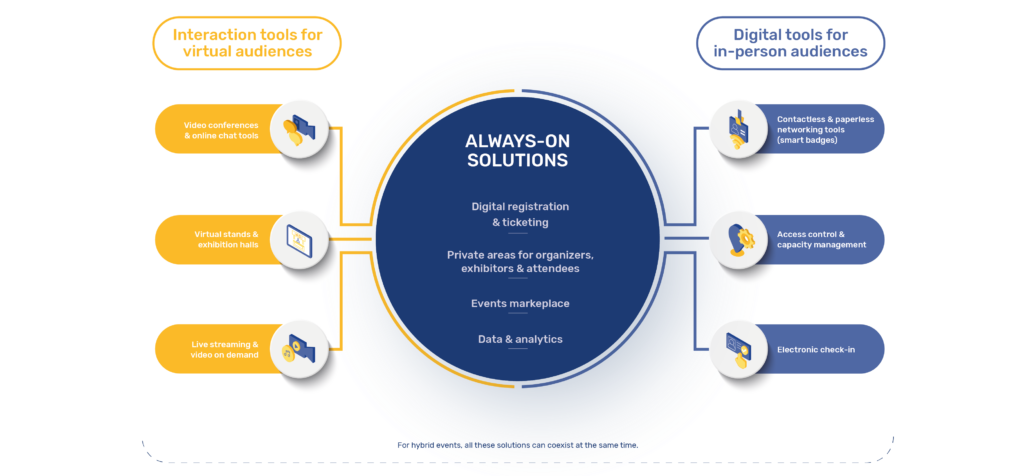We’ve come to the conclusion that pre-pandemic events no longer completely meet the needs of your attendees and the goals your company has set out to achieve. Now, you’re looking for alternatives to organize successful events. If in-person isn’t enough to leverage events with major returns anymore, which solution should you choose? The answer is hybrid events with a hybrid events platform.
As with in-person events, you probably wouldn’t choose a venue without first seeing if it meets your expectations. In this case, you need to look at the hybrid events platform offerings and see if it has the features to deliver the event you need.
Through the core of this article, you’ll learn what hybrid events are and their benefits, and what are the 5 features you need to help you succeed by reaching your goals faster than ever before.
What are hybrid events and what benefits do they have?
Simply put, a hybrid event is an event that combines the technology benefits of online events with the traditional benefits of in-person events. This means that your virtual audience can participate in the comfort of their homes, not worrying about commuting to the event location, while your in-person audience can count on a more personal and exclusive experience.
As for the event organizers, they can benefit from giving an all-rounded event experience, reaching a bigger audience with more possibilities to drive attendees’ engagement. And why is success guaranteed if you do so? Because you’ll unavoidably explore the global reach of hybrid events, gain a greater ability to engage your distributed audiences, and have the possibility to attract major sponsors. All with less associated costs and always following up on data and metrics.
What is a hybrid events platform?
A hybrid events platform is a platform that allows you to combine the best of both worlds when it comes to hosting memorable events. Its main goal is to bring both audiences together, in-person and online, giving them the equal opportunity to interact as if they were in the same place together.
Get a comprehensive overview of beamian’s hybrid events solutions:

If you think about it, you’ll have more chances to reach a bigger audience because there are no physical barriers, since you can make your event available and deliver its content to individuals who wouldn’t, otherwise, be able to join your event because of these same limitations. This is a huge benefit but it isn’t the only one.
Benefits of using a hybrid events platform
-
Integrated hybrid events platform for both audiences
There’s a trending word out there, and it is omnichannel. Businesses from all industries are trying to adapt and offer an integrated experience with both the virtual and real world. As you’ll be dealing with two different types of audience (in-person and online), it’s important to integrate the attendees and the experience itself into a single platform.
-
Time-saving
By automating every process when it comes to administrative tasks like registration and check-ins or sending out email invitations, you can save a lot of time.
-
Event branding made easy
As we know, it’s important to have our visual identity when creating an action that represents our organization. A hybrid events platform allow you to do this without potential visitors realizing that it belongs to a third-party platform.
-
Improve your events with valuable insights
Data gives you a deep insight into what’s happening at every moment of the event. This is extremely valuable when understanding how you can improve in the future.
-
Attendee engagement
As you’re dealing with a heterogeneous audience it can be more challenging to think of different ways to engage with them. But, if you’re looking to improve attendee experience and engagement, you’ll need to have the knowledge of the different tools and tactics available these platforms offer and make the most out of it. When you have the knowledge, you can apply the right strategies to reach a much more positive outcome when comparing exclusively to an in-person event.
5 must-have hybrid events platform features
Now that you’ve seen what hybrid events can offer, and you’ve made the decision to host one, you need to choose the right features to do so.
1. Customer support and troubleshooting
If you’re going to start using a hybrid events platform for the first time, you may need to have as much support as possible. Even if you already have some experience in organizing this type of event, there are inherent problems when using digital platforms, such as an event management software.
For some reason and at any time, you may have some kind of problem and it’s, therefore, necessary that the support team is available to help you throughout the process.
Another important aspect will be the ability of this same team to give a fast response if you have a specific need, such as changing a certain feature or introducing a new one. A dedicated team will make sure you have everything you need to create a great event experience.
2. Enhanced content delivery
With hybridization, you have the advantage of recording your speakers and sessions through event live streaming. For this reason, you have the opportunity to deliver this content to attendees who couldn’t join a certain session or want to watch it again within a couple of days or even weeks after the event is over. That’s why you need to be ready if your audience asks you for recorded sessions through live streaming.
Knowing how to choose the best live video streaming for events is crucial because for an event to be considered hybrid it needs to replicate the in-person experience in the virtual realm. That’s why you must ensure your live streaming service doesn’t present problems like delays or buffering. You also need to make sure that your live streaming solution runs smoothly, with enough capacity for the expected attendees.
Find out more on why live streaming is a main concern to event planners.
3. Engagement tools
If in in-person events the content that is presented is already king, then in hybrid events it goes far beyond that. The main challenge with this type of event is, above all, the online audience. The question is: how can we increase virtual events attendees’ engagement that naturally, given their surroundings, may have multiple distractions? The answer is content. For this reason, it’s important that the hybrid events platform you choose has digital tools that draw the audience’s attention and enhance their interaction. Make sure the platform you choose has the following content tools:
- Polls and a user-friendly voting system;
- Moderation live Q&A feature;
- Real-time chat;
- One-click video invites (for one-to-one or group meetings);
- Gamification;
- Contactless solutions for events.
4. Customizability
When you’re choosing a hybrid events platform it’s crucial that it gives you the ability to apply your company or clients’ marketing and branding elements. Try to understand if the platform allows customizable themes, banners, placeholders, and emails on the event website or platform itself.
This is very important because it’s necessary to give the perception that your company owns the whole event, which may translate into greater credibility and consequent participation.
5. Reports and analytics
How do you know if your event was a success? By extracting useful data and creating reports based on key performance indicators. This is why you need to make sure that the hybrid events platform can provide you with key metrics such as:
- Number of established interactions, either with products or with exhibition booths;
- Attendance & engagement rates;
- Shared contacts per exhibitor;
- Revenue tracking;
- Attendance satisfaction metrics;
- And others according to your specific goals.

Using a hybrid events platform for your next event: where to start
Now that you know what hybrid events are, their tools and how they can help you achieve your goals faster, it’s time to understand the starting point. Here’s a step-by-step guide to plan your first event:
1. Identify your hybrid events goals
When identifying your hybrid event goals, it’s important to answer certain questions upfront:
- Why am I hosting a hybrid event?
- What do I want to achieve with this event?
- What do I have to offer to my target audience?
- What value can I add to my exhibitors and sponsors?
Having a clear understanding of the purpose, you can now define the real goals of your events and the KPIs that will measure their success towards them.
2. Draw up a preliminary plan of the event
The next step you should be looking at after defining your goals and target audience should be a preliminary vision of your event.
- Event date: What is the estimated time frame of your event?
- Attendance: How many attendees will possibly join your event? Will you have enough capacity at the venue you choose?
- Type of event: Will it be a job fair or a trade show? Single-day or multi-day event?
- Location: Start by creating a list of possible venues to host the in-person part of your event.
When you have the first draft of what your event will look like, you can now have some insights into what your expected expenses will be, and you’ll also have an easier time defining a budget.
3. Address your budget allocation
You know things get serious when we’re talking about budgets. This will ultimately vary depending on the type and size of your event. Here’s a list of things you should consider:
- Venue rental and associated additional costs;.
- Hybrid events platform you’ll be using and additional features;
- Audiovisual equipment for your in-person speakers and audience;
- In-person staff and accommodations (if applicable);
- Catering services;
- Branding and marketing materials;
- Event marketing and communication;
- Additional equipment (extra chairs, tables).
Facing the required budget is when you realize if your expectations align with reality. If it doesn’t, you need to sacrifice some of the previous topics without compromising the success of the event itself.
4. Put together a talented event team
Even though some of your audience will be online and the staff you’ll need will probably be less than a full-on in-person event, you still need to fill in some roles so you can secure your event success.
Your event team may vary according to the event size and type. However, here’s a list of some of the most important roles you may need to look out for:
- Event Manager: responsible for leading the hybrid event such as managing the whole team, partnership, and allocating the budget;
- Marketing Manager: responsible for communicating the event across various media channels;
- Sponsorship Manager: responsible for creating and maintaining the relationship with sponsors;
- Talent Manager: responsible for managing the talent pool, such as speakers;
- Event Technology Partner: responsible for managing every technological aspect of the event, such as the event platform and live-streaming source;
- Social Media Manager: taking care of the social media interactions and communicating in real-time, before, during, and after the event.
5. Get the venue choice right the first time
One of the advantages of hosting a hybrid event is that you can rent a smaller venue since you’ll have an online audience too. However, you need to make sure you can fit all the equipment and technology to make all this possible. Equipment aside, make sure you also have enough space so attendees can have networking sessions, as this is one of the main reasons they join in-person events.
6. Choose a reliable technology partner
When it comes to choosing a reliable event technology partner, there are two types of characteristics to take into account: intangible and tangible.
The intangible characteristics can be summed up in one – the relationship you’ll have with the technology provider itself. If you have any kind of problem, will you get the assistance you need? Are they going to advise you on the kind of features that you’re going to need? We’re all here to succeed in business, but what dictates the success of a business? The people that are part of them and their relationships.
Tangible features are simply about the kind of functionalities you want to have. If you’re comfortable with technology, then you might want a platform that allows you to enjoy self-service. If you need features that the platform doesn’t offer in the first place, will they be able to meet your needs through premium service and deliver what you need?
In addition to these questions, when it comes to choosing an event management platform, you can also filter your choice by your needs. Ideally, you’ll identify your event needs and choose the features accordingly. But, with a wide sea full of event platforms, choosing one can be quite challenging.
Reminder: Make sure you have the tools needed when it comes to online registration, ticketing, live streaming, analytics and reporting, and also the right tool for lead retrieval and lead capture.
As you’ve realized, there are plenty of benefits associated with hybrid events, and now, with all the knowledge you acquired in this article, you’ll be able to choose the right hybrid events platform with the features needed to launch a successful hybrid event. The future isn’t one-hundred percent virtual nor in-person. The future is hybrid.








